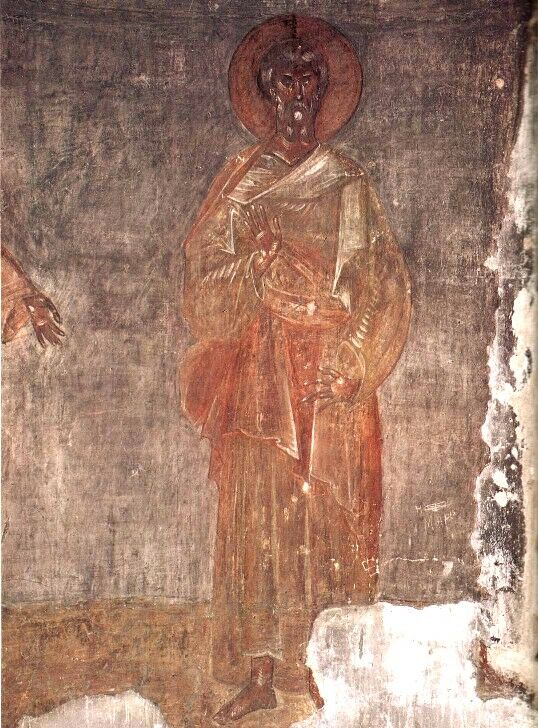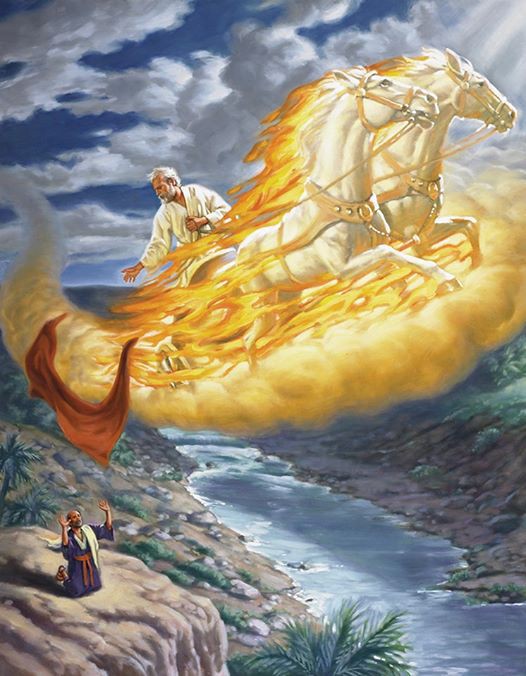Enoch & Elijah are not in Heaven! But do you know where the Bible says they are?
|
Christians have long believed that Enoch and Elijah were “translated” to Heaven. That belief, however, is based on a faulty assumption. Learn what the Bible says really happened after Yahuwah took them. It’s not what you’ve been told! |
Have you ever believed something to be true only to discover later that you had been wrong all along . . . and all because your belief was based on an incorrect assumption? I have! And it always surprises me to learn the truth because, usually, the facts were there all along, I had just overlooked them because they did not agree with my assumption.
That is what has happened with the stories of Enoch and Elijah. We have assumed that when Yah “took” them, He took them to Heaven. But that simply is not the case and I can prove it from the Bible!
Enoch
 Most of what we know of Enoch is found in four short verses in Genesis five:
Most of what we know of Enoch is found in four short verses in Genesis five:
Enoch lived sixty-five years, and begot Methuselah. After he begot Methuselah, Enoch walked with Yahuwah three hundred years, and had sons and daughters. So all the days of Enoch were three hundred and sixty-five years. And Enoch walked with Yah; and he was not, for Yah took him. (Genesis 5:21-24, NKJV)
It is interesting to note that Moses did not say that Enoch is still walking with Yah. He certainly could have done so; he had the words to express that! But he didn’t. Rather, he phrased it as something that Enoch had (past tense) done. Further, Moses flatly states: “All the days of Enoch were three hundred and sixty-five years.” If Enoch had been carried to Heaven as we’ve assumed, the number of his days would be continuing to increase. But that is not what Moses said.
The reason is simple: Enoch died. It is very possible in those violent, antediluvian times that this preacher of righteousness was actually murdered. The sacred record is silent as to the particulars. However, one fact we can know unequivocally is that Enoch died. Millennia later, John the beloved, under inspiration, would write: “No one has ascended to heaven but he who came down from heaven, that is, the Son of Man who is in heaven.” (John 3:13, NKJV) This is what is called an “all-ness” statement. It is inclusive of everyone: “No one has ascended to heaven.”
ALSO - Enoch is included in the list of those who died. Read the whole text.
In Hebrews 11:
5 By faith Enoch was translated..................
13 These all died in faith, not having received the promises, but having seen them afar off, and were persuaded of them, and embraced them, and confessed that they were strangers and pilgrims on the earth.
The confusion has entered over the word “translated.” Hebrews 11:5 states: “By faith Enoch was translated that he should not see death; and was not found, because Yahuwah had translated him.” Notice it does not say that Enoch was taken to Heaven when he was translated. It states that he was not found.
The word “translated” comes from the Greek word, metatithemi. The primary definition of this word is to “convey to another place . . . [to] transfer.”1 This is exactly the same Greek word that, in Acts 7:16, is translated “carried over” when explaining that after Jacob’s death, his body was translated/carried over/metatithemi to Shechem where he was buried with his fathers in the cave of Machpelah. In other words, Yahuwah did for Enoch what He would later do for Moses: “So Moses the servant of Yahuwah died there in the land of Moab, according to the word of Yahuwah. And He [Yahuwah] buried him [Moses] in a valley in the land of Moab, over against Bethpeor: but no man knoweth of his sepulchre unto this day.” (Deuteronomy 34:5-6, KJV)

As for the phrase that Enoch was translated so that “he should not see death,” remember that Scripture teaches there are two deaths: there is the death of the body that is the result of sin, and there is the death (ultimate destruction) of the soul. This fate awaits all who refuse to turn to Yah in repentance. It is this second death to which the author of Hebrews 11 was referring because later, in that same chapter, he unequivocally states, “And all these, having obtained a good testimony through faith, did not receive the promise.” (Hebrews 11:39) Everyone listed in Hebrews 11—and that includes Enoch—has died the physical death, but through faith, they shall not “see” the second death of annhilation.
Elijah
 The story of Elijah is especially intriguing because not only did Yahuwah “translate” him to another place via a fiery chariot, but Scripture reveals he actually lived on earth for at least four to five years afterward!2
The story of Elijah is especially intriguing because not only did Yahuwah “translate” him to another place via a fiery chariot, but Scripture reveals he actually lived on earth for at least four to five years afterward!2
Second Kings 2:11 states that “Elijah went up by a whirlwind into heaven.” The word “heaven” in Scripture actually refers to several different levels. There is Heaven—the third heaven—which is the home of the Creator, of course. There is also the second heaven in which are the planets, sun, moon, and stars. The heaven referred to in 2 Kings 2:11 is the first heaven: the atmosphere. Obviously, for there to be a whirlwind, it would have to be within the first level of “heaven.” As we understand it, whirlwinds do not exist beyond the canopy that encloses the atmosphere above the earth.
More intriguing still is what happened to Elijah afterward. Scripture does not say where, precisely, Elijah was taken, but the fact that the mantle of leadership passed to Elisha while Elijah continued to live becomes clear once you learn the history of the kings of Judah and Israel. Just before Elijah was taken, a new king came to the throne of Israel. Confusingly for modern readers, Israel’s new king had the same name as Judah’s king. They were both called Jehoram! (See Second Kings 1:17.) Judah’s Jehoram had been co-reigning with his father, Jehoshaphat, for about two years at this time. Four years later, King Jehoshaphat died in 845 BCE. Jehoram, king of Judah, promptly slew his brothers to secure the throne. He also moved to reestablish paganism throughout Judah. The Bible records “he had forsaken Yahuwah Elohim of his fathers.” (Second Chronicles 21:10, KJV) But then, something astonishing happened! Something that would have been impossible if Elijah were dead or in Heaven with Yahuwah. Wicked King Jehoram received a letter.
Moreover he [Jehoram of Judah] made high places in the mountains of Judah and caused the inhabitants of Jerusalem to commit fornication, and compelled Judah thereto. And there came a writing to him from Elijah the prophet, saying, Thus saith Yahuwah Elohim of David thy father, Because thou hast not walked in the ways of Jehoshaphat thy father, nor in the ways of Asa king of Judah, But hast walked in the way of the kings of Israel, and hast made Judah and the inhabitants of Jerusalem to go a whoring, like to the whoredoms of the house of Ahab, and also hast slain thy brethren of thy father’s house, which were better than thyself: Behold, with a great plague will Yahuwah smite thy people, and thy children, and thy wives, and all thy goods. (Second Chronicles 21:11-15, KJV)
This is astonishing! This letter came roughly four years after Elijah “went up by a whirlwind into heaven.” (Second Kings 2:11) While we do not know where he lived out the rest of his natural life, it wasn’t in Heaven. Clearly, as John would state nearly a thousand years later, “no man hath ascended up to heaven.” (John 3:13) Enoch and Elijah, as faithful servants of the Most High, are resting in the grave awaiting the return of Yahushua when they, with the faithful of all ages, will be raised incorruptible to live forever in the earth made new.|
For more evidence from Scripture on this startling revelation, look for our radio program, “Learn what happened to Enoch and Elijah. It’s not what you think!” |
1 Greek-English Lexicon of the New Testament, 1969 edition.
2 Being transported by Yah’s spirit is not unheard of. There is at least one, possibly two other incidents given in Scripture. The first, recorded in Luke 4, when the villagers in Nazareth tried to kill Yahushua on the Sabbath:
And all they in the synagogue, when they heard these things, were filled with wrath, and rose up, and thrust him out of the city, and led him unto the brow of the hill whereon their city was built, that they might cast him down headlong. But he passing through the midst of them went his way, and came down to Capernaum, a city of Galilee, and taught them on the sabbath days.” (Luke 4:28-31, KJV)
The second occurrence was after Philip baptized the Ethiopian eunuch:
And when they were come up out of the water, the Spirit of the Lord caught away Philip, that the eunuch saw him no more: and he went on his way rejoicing. But Philip was found at Azotus: and passing through he preached in all the cities, till he came to Caesarea. (Acts 8:39-40, KJV)
We also make note of Mathew 17:1-9 in what some refer to as ‘The Mount of Transfiguration’ in which Moses and Elijah appeared with Yahushua in a vision.
Related Content:







